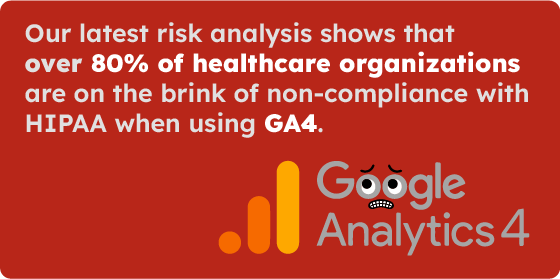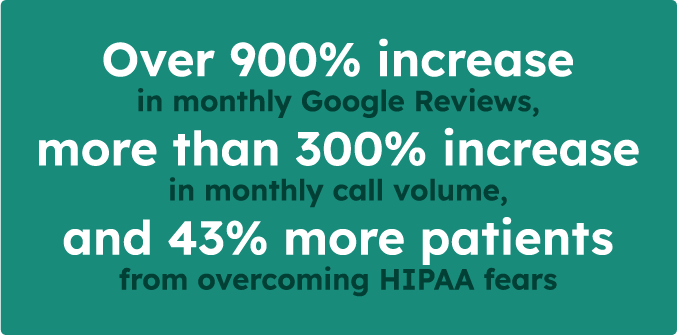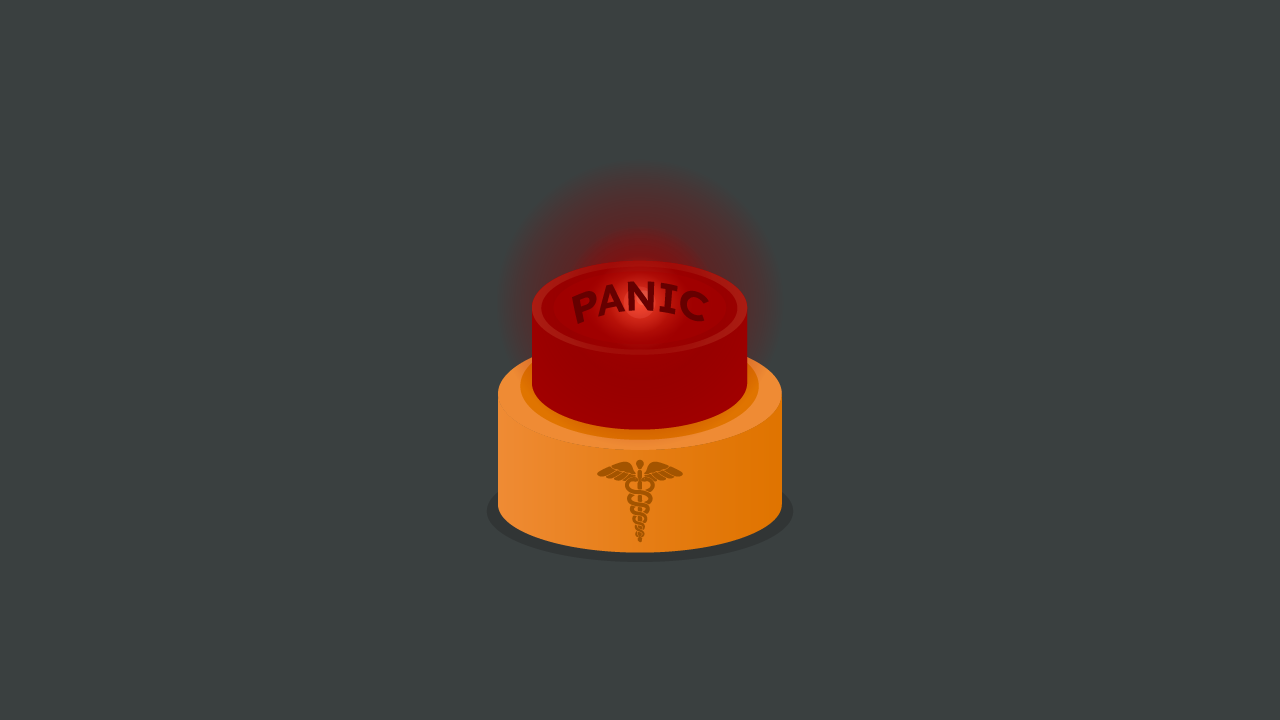Handling a large amount of private patient information is an everyday routine in healthcare. Due to the sensitivity of such data, it was inevitable to establish a set of rules for keeping it safe. One of these is the Health Insurance Portability and Accountability Act (HIPAA), widely recognized as the main guardian of Protected Health Information (PHI). It’s also known for sending shivers down the spine of healthcare marketers.
The common story around HIPAA and marketing contains details like complexity and constraint. Patient information may easily slip away in the vastness of the internet and cause serious damage. Because of that, many healthcare providers question the need for digital marketing strategies. Instead, they mainly choose to avoid possible HIPAA violations and hefty fines.
It’s time to shed some light on this. Navigating narrow HIPAA paths is possible and even beneficial. Also, it’s necessary in the age when patients turn online for everything they need, from shopping to scheduling complex healthcare treatments.
The key is to look at HIPAA as an opportunity to innovate and build trust instead of as an obstacle. We’ll see a couple of real-life examples that support this statement.
Unplugging Healthcare Marketing: Do You Really Want to Go Down This Road?
Stepping back when pairing HIPAA and marketing may be the expected first reaction, but it’s not a well-informed one. It’s often the result of a lack of clear guidance and understanding of what HIPAA compliance means in terms of marketing. Yet, apprehension persists.
In reality, understanding the nuances of compliant marketing elements, like tracking and analytics, can put HIPAA fears to rest. However, digital marketing’s reliance on sensitive patient data can still seem daunting for uninformed healthcare providers and lead them to believe that it’s worth avoiding digital marketing for healthcare.
Unplugging from digital marketing is not a strategic move in today’s technology-driven world. It comes with a high price: from losing patients to putting your practice’s sustainability at risk.
The High Cost of Avoidance
Let’s examine the consequences of avoiding digital marketing due to HIPAA’s strictness. Losing online visibility is only one of them, and it is rather light compared to others. The real cost is quite higher than that.
Your patients search for healthcare online. They check symptoms, analyze reviews when deciding which doctor to choose, and look for the most convenient treatment options. Your disconnection from the digital world leaves them with a feeling that you’re not interested in their needs or worse—makes you invisible as an option. This engagement gap can lead to a decline in patient satisfaction, affecting the growth and reputation of your practice.
Without patients, there’s no revenue. It’s simple math. Digital marketing is a powerful tool for patient acquisition, so avoiding it out of HIPAA compliance fears can result in significant income loss. The best possible care for patients is your main focus, and it should be. But without enough money to cover your costs and invest in innovative healthcare solutions, patients will simply go to those competitors who have probably enjoyed the benefits of HIPAA-compliant marketing for a while now.
Effective digital marketing is about more than promoting your services. You can share health tips, educate the public, and prevent health risks, contributing to your community’s well-being. Shying away from this option deprives you and your patients of critical information exchange.
On top of all that—digital marketing allows you to precisely track your patient acquisition cost and ROI, allowing you to optimize your spend and make data-informed budget decisions.
The cost of avoiding digital marketing due to HIPAA compliance concerns is too high to ignore. Simply put, you shouldn’t be afraid of digital healthcare marketing—you should be afraid of not doing it.
The main challenge is not whether to jump on the digital marketing train. It’s how to do so in a HIPAA-compliant way.
Digital Marketing Platforms and HIPAA Compliance: Know Where You Stand
It’s important to know that many popular online tools and platforms aren’t fully compliant with HIPAA. This may be surprising, especially when it comes to services like Google Analytics, which are essential for the success of digital marketing strategies.
Either way, navigating different digital marketing paths requires your keen understanding of where popular internet platforms stand regarding HIPAA compliance. Using digital tools presents a specific challenge in HIPAA-compliant marketing. You must address it to ensure your strategies do not lead to compliance issues. Simply put – in this case, HIPAA compliance is your responsibility.
 The GA4 Conundrum in Healthcare Community
The GA4 Conundrum in Healthcare Community
Google Analytics, particularly its latest iteration, GA4, is considered an indispensable tool for marketers seeking to understand online traffic and user behavior. However, healthcare marketers face serious issues when trying to collect data in a way that doesn’t violate HIPAA regulations.
Our latest risk analysis shows that over 80% of healthcare organizations are on the brink of non-compliance with HIPAA when using GA4. Willful negligence is not the reason behind this. You need more awareness about collecting and analyzing the data when it comes to HIPAA and marketing in healthcare.
No doubt, this seems like another good reason to steer clear of the digital marketing game. But, as we have seen, there are better options than giving up. The key lies in configuring tools like GA4 to protect patient data and avoid capturing any (PHI).
Social Media, HIPAA, and Marketing: Navigating a Minefield
The Meta Pixel HIPAA scandal is still fresh in our memory. It’s also an appropriate example of how a lack of knowledge about the rules can harm patient privacy.
Social media platforms are an invaluable part of every digital marketing strategy necessary to engage with patients. However, these platforms are not eager to comply with HIPAA. For example, if you ask Facebook to sign a HIPAA Business Associate Agreement (BAA), obliging both parties to protect the PHI, they’ll refuse your request.
This leaves you with the duty of taking a cautious approach to social media marketing. You need to ensure that PHI is not disclosed in a way that breaches HIPAA rules and that your online engagements respect patient privacy.
Understanding Your Position
This doesn’t seem convincing when we talk about using digital marketing with the strict HIPAA standards hanging over us. But the trick is to know your limits and explore the possibilities of online platforms. You can still find HIPAA-compliant ways to use digital marketing tools and platforms to your advantage.
The complex nature of the HIPAA and marketing relationship shouldn’t deter you from harvesting the numerous benefits of the digital age. Instead, you should adopt the strategic approach of fitting your online presence in the HIPAA compliance frame.
Navigating HIPAA Compliance in Marketing
At this point, you may still think HIPAA-compliant marketing is a big bite. Simplifying the relationship between HIPAA and marketing is crucial for opening a new perspective.
Conducting a detailed risk assessment to identify potential data vulnerabilities in your marketing strategies would be a wise first move. Ensure encryption for all digital communications and data storage. Also, keep your marketing team educated. Make them familiar with HIPAA rules and make sure they understand the boundaries of compliant marketing practices.
When it comes to data sharing, integration, and tracking, it’s important to know who you partner with. The partners you choose can make or break your marketing plans. Choose those who are willing to sign a BAA with you and have a proven HIPAA-compliant work record. Some specialized healthcare marketing agencies have a deep understanding of HIPAA compliance and use the latest innovative solutions to optimize digital marketing performance.
Also, maintaining patient privacy is one of the main guidelines for developing a healthcare marketing strategy. Create content that adds value without compromising patient confidentiality. Use anonymized data for analytics and personalization, ensuring that individual identities are protected. If you want to use sensitive data in a campaign (for example, a testimonial from a patient survey), obtain the patient’s explicit and written consent first.
It’s Time for Success Stories: Care to Join?
This story isn’t all talk and no action: here are a few examples showing how marketing under HIPAA measures can yield powerful results.

Let’s talk about OrthoAlaska – a group of orthopedic, rheumatology, and primary care providers devoted to addressing the rising healthcare costs in their state. Determined to fulfill that mission, they soon realized they needed the support of HIPAA-compliant digital marketing tools. They started using our comprehensive healthcare marketing platform in 2018.
The result? An over 900% increase in monthly Google Reviews, more than 300% increase in monthly call volume, and 43% more patients from the day they decided to overcome HIPAA fears and started using digital marketing for healthcare in their favor.
Another success story comes from the Desert Orthopaedic Center (DOC), a Nevada-based group of orthopedic professionals. At the end of 2023, they decided to try and increase revenue by driving more interest in their high-value procedures. Using digital marketing tools like HIPAA-compliant patient targeting, they achieved these stunning results: a 3,191% return on investment, 190 surgical interventions, more than $2 million in charges, and an expected collectible revenue of $1.2 million.
These numbers clearly show that HIPAA and marketing can successfully coexist.
Follow HIPAA to Make Your Digital Marketing More Convenient for Patients
You can successfully create and benefit your digital marketing strategies with a clear awareness of marketing options within HIPAA boundaries.
SocialClimb is made for healthcare providers who wish to deliver compelling digital marketing campaigns but feel HIPAA is a barrier to their success. Our comprehensive HIPAA-compliant healthcare marketing platform ensures your marketing efforts prioritize patient safety and maximize PHI security. Automated options for tracking and reporting are designed in line with the HIPAA rules, meaning all patient data remains protected while you get detailed insights for data-driven decision-making.
Within this platform, HIPAA and marketing work together to improve outcomes for both you and your patients, making digital marketing for healthcare a seamless process free of data security worries.











